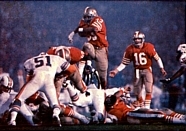| Regular season | |
|---|---|
| Duration | September 2 – December 17, 1984 |
| Playoffs | |
| Start date | December 23, 1984 |
| AFC Champions | Miami Dolphins |
| NFC Champions | San Francisco 49ers |
| Super Bowl XIX | |
| Date | January 20, 1985 |
| Site | Stanford Stadium, Stanford, California |
| Champions | San Francisco 49ers |
| Pro Bowl | |
| Date | January 27, 1985 |
| Site | Aloha Stadium |

The 1984 NFL season was the 65th regular season of the National Football League. The Colts relocated from Baltimore, Maryland, to Indianapolis, Indiana, before the season.
Contents
- Player movement
- Transactions
- Trades
- Retirements
- Draft
- Supplemental draft of USFL and CFL players
- Major rule changes
- 1984 deaths
- Division races
- National Football Conference
- American Football Conference
- Preseason
- Regular season
- Scheduling formula
- Final standings
- Tiebreakers
- Playoffs
- Notable events
- Milestones
- Statistical leaders
- Team
- Awards
- Coaching changes
- Offseason
- In-season
- Stadium changes
- Uniform changes
- Television
- Regular season games not broadcast by Network TV
- References
The season ended with Super Bowl XIX when the San Francisco 49ers defeated the Miami Dolphins 38–16 at Stanford Stadium in California. This was the first Super Bowl televised by ABC, who entered into the annual championship game rotation with CBS and NBC. This game marked the second shortest distance between the Super Bowl host stadium (Stanford, California) and a Super Bowl team (San Francisco 49ers). [1]
The 49ers became the first team in NFL history to win 15 games in a regular season and to win 18 in an entire season (including the postseason). Additionally, two major offensive records were set this season, with quarterback Dan Marino establishing a new single-season passing yards record with 5,084 (later broken by Drew Brees in 2011, 2012, 2013 and 2016, by Tom Brady in 2011, by Peyton Manning in 2013, by Ben Roethlisberger and Patrick Mahomes in 2018 and by Jameis Winston in 2019) and Eric Dickerson establishing a new single-season rushing yards record with 2,105. Another statistical record broken was Mark Gastineau for most sacks in a single season, with 22 (surpassed by Michael Strahan in 2001 and by T.J. Watt in 2021).
Also during the season, San Diego Chargers wide receiver Charlie Joiner became the all-time leader in career receptions; he set that mark in a game between the Chargers and the Pittsburgh Steelers at Pittsburgh's Three Rivers Stadium.
In a week 10 game against the Kansas City Chiefs, the Seattle Seahawks set numerous NFL records for interception returns, including most interception return yardage in a game and most interceptions returned for touchdowns in a game with 4 (all touchdowns over 50 yards in length). The Seahawks also tied an NFL record with 63 defensive takeaways on the season.
Salaries increased significantly over the past two seasons in the NFL, up nearly fifty percent; new Houston Oilers quarterback Warren Moon led the list at $1.1 million. [2]


